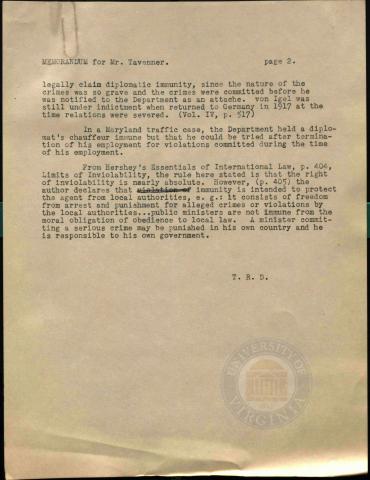
Page 2
| Parent | Memo of citations on cases or theory supporting punishment of diplomatic agents in conspiracy cases |
|---|---|
| Date | 12 December 1947 |
| Language | English |
| Collection | Tavenner Papers & IMTFE Official Records |
| Box | Box 6 |
| Folder | General Reports and Memoranda from December 1947 |
| Repository | University of Virginia Law Library |
MEMORANDUM for Mr. Tavenner.
legally claim diplomatic immunity, since the nature of the crimes was so grave and the crimes were committed before he was notified to the Department as an attache. von Igel was still under indictment when returned to Germany in 1917 at the time relations were severed. (Vol. IV, p. 517)
page 2.
In a Maryland traffic case, the Department held a diplo-mat's chauffeur immune but that he could be tried after termina¬tion of his employment for violations committed during the time of his employment.
From Hershey's Essentials of International Law, p. 404, Limits of Inviolability, the rule here stated is that the right of inviolability is nearly absolute. However, (p. 405) the author declares that immunity is intended to protect the agent from local authorities, e. g.: it consists of freedom from arrest and punishment for alleged crimes or violations by the local authorities...public ministers are not immune from the moral obligation of obedience to local law. A minister commit¬ting a serious crime may be punished in his own country and he is responsible to his own government.
T. R. D.
